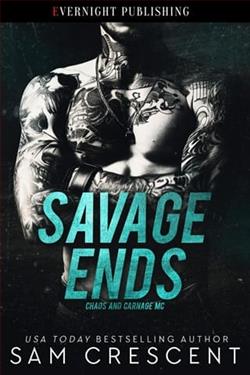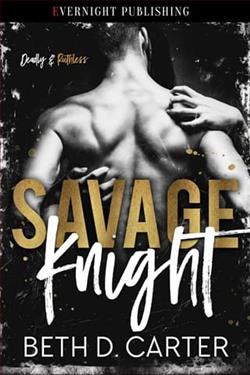Page 96 of Between Fear and Favor
The antler god was long dead, fallen to antiquity, and the forestborn had followed. Had it been because of Rhia? Had she empowered the Myriad—just to stop him?
Six hands pressed down on an obsidian tomb. I blinked, wondering who the other five could belong to. Aonara and Ciarden, I supposed, their littlest fingers intertwined. Hanwen’s, scarred and sun-tanned. But the final two evaded me. One hand was long and thin, with pale skin and sharp fingernails, while the other was a bronze color, callused by a hardworking life. Those same hands drew lines of shimmering, golden blood over the obsidian lid beneath their palms.
“He would have killed everyone who wasn’t forestborn. You had no choice.” I couldn’t tell who spoke, but I wondered if they could have foreseen things going the way they had. Now, the full-blooded forestborn were all dead. Any elven blood at all was a rarity.
As Rhia lifted her hand, backing away from the tomb, her vision narrowed to the singular carving etched into the stone. Antlers, primitively drawn, were the only hint of what great power had been encased in such a prison. The goddess stood, unmoving. The day turned to night, and the night turned to day. The other gods had left, and all she did was linger.
My heart cracked in two. Rainier had been so lost in his grief and terrifying thoughts, and I’d been certain I was going to lose him. But never had he taken his anger out on me in such a way. He’d distanced himself and it had cut me deeply, but never anything more. And, while I thought he would wage war to avenge our child if it came to that, I didn’t think he’d raze entire continents, spawn endless brutality or kill people who were just as innocent as the child he’d lost.
Rainier wasn’t capable of doing something so cruel and rash. As Rhia continued her lonely watch, I wondered if I was.
I’d certainly contemplated it recently, hadn’t I? I’d considered taking Lux, flying over the Supreme’s army and killing every single person. Gods, I’d even instructed her to use divine flames on our streets—though that had been an attempt at defense.
When Elora had died, her body limp as she collapsed from a slit throat, I’d been blessed by Ciarden. I’d killed Dryul without a second thought. I would have killed Cyran too, if I hadn’t been so desperate to get to Elora. If her murder had been permanent, I couldn’t be sure I wouldn’t do exactly as the antler god had done.
Rhia laid down on the forest floor and wept. There was water behind her, the lapping sound of a quiet pond, and I thought perhaps it brought some comfort. As she lay in her grief, the earth surrounding the obsidian tomb grew dense with lush grass, reaching toward her. And then the plush greenery lengthened violently. Vines erupted, and sharp thorns pierced her sides. She screamed, the sound deafening, and I wished to escape these memories. I knew Rhia survived—she’d appeared in my dreams before—but the idea of a god suffering made my chest tighten in discomfort.
Just as I thought she would suffocate, the vines receded toward the tomb. Crouching before her, there was a young man. Almost identical to the antler god, he had long dark hair, curling at the nape. Green eyes, pale skin and antlers—though not quite as large. Rhia’s heart pounded in recognition, and her gasp was one of shock. That the man had helped? That she’d seen him? Was this her child too?
“Thank you, Aesiron,” she said, and I felt the vibration of her voice in my own throat. Was this young man the first forestborn king?
“Haveron,” he murmured, gaze searching the ground in front of him. “Aesiron is my grandfather, goddess.”
She nodded, standing. “I suppose I’ve been here an age.”
“You have not stirred, even when we’ve come to drink from the font,” he responded, glancing over her shoulder.
Rhia turned, staring down at the crystal clear water. So unlike the small stream I’d seen deep within the bowels of the Myriad Seat in Lamera, this pond was quite large. Awe filled me when I spotted a moonfish dart behind a rock. This font was brimming with life and beauty. The water lapped at the land, and Rhia dipped her bare toe into it.
“I cannot tend to it any longer,” she said. Haveron only blinked at her. “My presence only strengthens him. I have been able to contain him to this extent, but it is impossible to kill life itself. If Iemis has it his way, I am sure he will choke this font to death, just to spite me.”
“Then what are we to do?” the elf king asked.
“It will require sacrifice, but only those of his lineage can clear away this mess,” she said, gesturing to the grass that had now receded toward the tomb. “You, and your children after you, will be the Wardens of the Font.”
When she turned, her back to both the tomb and the font, and wandered past the elf king, she didn’t answer his many questions, only picking her way between the pines as she wandered out of the valley.
Abruptly, I woke. The temple was still and quiet, and all but one torch had gone out. Wiping sleep from my eyes, I watched as Malva quietly checked over each patient. She walked with a swaying censer, and I picked up the faintest hint of draíbea, used to calm and soothe the wounded so they could sleep. Moonlight streamed in through the stained glass beside me, and I glanced toward it.
To find Rhia.
I scrambled to stand, but stopped short.
“Don’t,” Rhia commanded, and though my fear over her presence wasn’t unwarranted whatsoever, I heeded her order. Stilling, I caught my breath with a hand to my chest.
“I cannot return,” she said, quietly, “to the font. But you must.”
“Why?” I asked, whispering. “I am not forestborn. I cannot tend to it?—”
“The Supreme seeks to wake Iemis, and I fear he may succeed.”
Chapter 45
ELORA
Shivani snored loudlyfrom my aunt’s bedroom. Mr. Carson had insisted on giving her my grandparent’s suite, but she’d ignored the man, opting instead to sleep in the room next to mine. I didn’t know why she’d chosen such close proximity. She had been rather kind during our week at Ravemont. Though we’d worked on siphoning, it hadn’t been exhaustive. The stable boy’s healing divinity wasn’t strong, but it was enough to fix minor wounds, and I was able to practice wielding it.
I hadn’t expected my grandmother to be so accommodating. When I’d asked to go to Ravemont to learn more about the ancestry Mama hadn’t taught me, she’d agreed immediately. Perhaps it was to endear me to her in wake of Mama’s failures. It perturbed me, the way she seemed to view our divide as opportunity.















